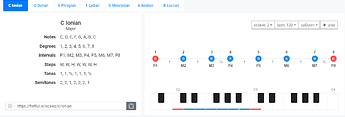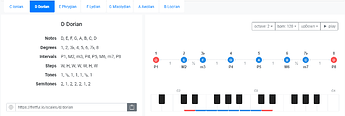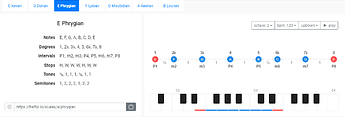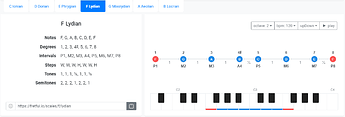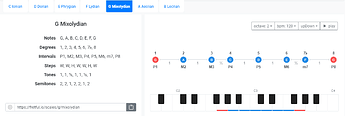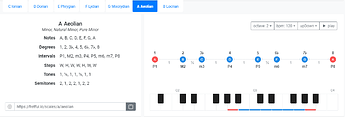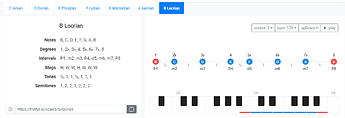Can not confirm, Can not deny ![]()
![]()
![]()
![]()
This is gold! Gold I say! Thanks for the word, and for the extra bits about the learning/student process!
Another late reply!!
I came to the bass by accident after strumming away in a very average fashion on the acoustic guitar for 10 years. We could never find a reliable bass player for the guys that I jam with so I was “nominated” to take on bass duties as well as sing (a whole new level of challenge).
I have a succession of a-ha moments as I learn the bass and fall further under its spell.
Firstly I love it a bit more each time I play it. I love the symmetry of the fret board and learning new patterns. Such a nerd. The mathematics of it almost have a beauty for me.
One moment sounds a bit stupid in hindsight but was great when I had the thought. One song we were playing had a progression that went from a D to a B. For some reason mentally I had always visualized notes from a lower note going up i.e. to play a B my brain went open A count up 2 half steps, OK fret 2 on A. I could never reliably land on the B coming from the D and it frustrated me. Then after one of the BB lessons I realized there was a B at 7th fret on the E which was closer to fret 5 on the A where I was playing my D. Strangely it didn’t occur to me when learning the notes on E. It filtered through my subconscious and appeared when I was next playing the song. BOOM!
Another of these moments occurred when I was trying to work out a solo by ear. We do covers of a local band that aren’t on Spotify and no chance of finding a tab. Great practice for transcribing. I had been plugging away at the solo for a while then my a-ha moment came when I realized they were noodling around on a major triad. From there it all fell into place as they kept the same shape and changed the starting note.
Currently almost through module 12 and cannot put into words just how much I have enjoyed learning how to get the most from my instrument, how much fun I’ve had and how grateful I am.
I love this stuff @Sherman! Thanks for the 2 cents.
My “aha!” Moment came just recently. I have a hard time writing bass lines and keeping time with the drums. Then all the sudden I was in my garage working out with my music turned up and I was really focusing on the drum part of the song I was listening to when it just hit me and I was playing air bass before I knew it. I had this line in my head and I immediately came inside and downloaded a metronome to my phone. I started playing along to it and it just clicked for me how to play along to the drummer. Such a good moment that just came when I least expected it and was just goofing off.
Something I’ve been threatening to do but never have. It certainly sounds like it’s worth the effort as I quite often struggle getting the basic drum rhythm especially with tunes I’m a little unfamiliar with
I feel exactly the same way!
I’m a very new player (currently on M4L3 in the B2B course) so my ah-ha moment isn’t all that earth-shattering for most, but it was pretty cool for me.
I was blown away upon learning that we can figure out all the notes on the fingerboard just by knowing the string you’re on and going up the musical notes. That may not seem like headline news, but for me it was huge! After the first time Josh explained this concept on the E string. I stopped the video and went through all he frets to see what notes they are and started comparing the same notes on different strings.
I don’t have a musical background, didn’t know the musical notes, and the idea of reading music/transferring that to an instrument is intimidating to me. While I’m not to that point (yet), I feel like I’ve seen the light and have confidence that I will eventually get there. Actually, once Josh explained it and it clicked in my head, I went out to tell my wife the “cool new thing I learned”.
I’m halfway through the course now, and I’ve had several little ah-hah moments throughout. One I remember is when I learned how to play the bass line to “With or without you” by U2. As a life-long U2 fan, this was kind of a big deal for me. Not only was I able to play an actual song, it was also a song by one of my favorite artists. After feeling confident enough, I looked up the song in my music collection and played along to it from beginning to end. Major feeling of accomplishment.
My biggest epiphany so far is all about scales. Having played some classic guitar and also some piano in my youth, I was already familiar with the concept. I had, however, no idea what scales were for. I always thought of playing scales as a boring but necessary tool to learn where the notes were on the fretboard (or on the keyboard), and I treated them as such: as a practice tool with no practical application.
Until! Until I reached Module 7 in the B2B course. Of course I knew I would eventually need to learn how to play scales on the bass, and again I thought of this as something I’d just have to go through in order to progress through the course. So OK, yeah yeah, this is the C Major scale, alright, let’s move on… Wait a minute, so now that I know how to play this scale, I can actually play any major scale, using the same shape, by just starting on a different note? OK, that’s pretty cool. Hold on, so by finding out what key a song is in, you can immediately play along to it by just choosing notes in the corresponding scale? Now that is really cool!
I eventually found myself enjoying the improvisation lessons immensely, something I would have never expected. Forty years after having been introduced to scales, in a matter of minutes, I suddenly understood what scales are for, what their purpose is. Not one of my music teachers had ever bothered to explain that to me, at least, not that I can remember.
I liked the improv lessons so much that I didn’t want them to stop, and I found the workouts just too short. Then I realized the backing track is not much more than a drum beat and Josh playing a very basic bass line. So, wait a minute, I have a Zoom B1Xon that has a drum machine and a looper… I ended up recording myself over a drum pattern, just playing a root note on the first beat for four bars, and then playing that back. Instant and infinite backing track for endless improvisation. Needless to say, I felt like a true musician 

I had a mini ah hah moment today when I realized that:
- the 12th fret is halfway between the nut and the saddle
- the 24th fret is halfway between the 12th fret and the saddle
- the 5th fret is halfway between the nut and the 12th fret
Makes sense in hindsight, but didn’t click until today for some reason. 
I still didn’t finish the last 2 lessons of the B2B course because I got totally side-tracked by slapping for weeks now.
Love it!
Now I am able to play the “Take the Power back” riff by Rage against the Machine at ca. 100 bpm and realized that it is soooo true to practice slooOOooooOOooOOoow (…speaking in whale).
Speed came by itself.
Glorious stuff here @Mike_NL!
You reminded me of the first time I played a song I loved on an instrument - Metallica’s Nothing Else Matters (all open strings on my dad’s acoustic guitar).
That’s what got me into music!
Thanks for all this.
@akos - this didn’t click for me until a Physics Of Sound course in college. Blew my mind. I’d been playing for 10 years!!!
I love to hear this… First because of the success you feel/experience and then - it’s nice to know that from my Teaching High Horse, as I holler at folks to do difficult things (that I often forget to do myself)… that the difficult things actually work!
Well, through the work I’ve been doing with fretful (Fretful.io (fretboard visualizer) - Alpha release) I finally understood what modes are for and consequently how to derive any chord from any scale. And specially why they are so useful for improvising! This was a seriously mind exploding “ah hah!” moment for me.
So, take C major scale and its modes for instance:
C Ionian
Intervals: P1, M2, M3, P4, P5, M6, M7, P8
Ok, that’s a C major / C major 7
D Dorian
Intervals: P1, M2, m3, P4, P5, M6, m7, P8
Ok, that’s a D minor / D minor 7
E Phrygian
Intervals: P1, m2, m3, P4, P5, m6, m7, P8
Ok, that’s a E minor / E minor 7
F Lydian
Intervals: P1, M2, M3, A4, P5, M6, M7, P8
Ok, that’s a F major / F major 7
G Mixolydian
Intervals: P1, M2, M3, P4, P5, M6, m7, P8
Ok, that’s a G major / G dominant 7
A Aeolian (minor)
Intervals: P1, M2, m3, P4, P5, m6, m7, P8
Ok, that’s a A minor / A minor 7
B Locrian
Intervals: P1, m2, m3, P4, d5, m6, m7, P8
Ok, that’s a B diminished / B minor 7th flat 5
Still to figure out, why the hell are there only major and minor keys.
19 posts were split to a new topic: Keys other than major/minor?
Kind of silly since I should’ve known it before from playing guitar…
The way B2B was built and the explanation with the shapes, scales and so on there was a moment in the course in which I went: “urrrghhh, why didn’t I notice? pentatonic scale always fits because it’s the shared notes between major and minor.”
Maybe Josh even mentioned it in the video but it clicked a moment before.
I also frequently use the imaginary shapes to find my way on the fretboard but there wasn’t a singular “aha” moment. More accepting it as a good method to have remember less from the B2B course.
Finally had a little victory today and a small ah ha moment!
I’ve really been playing badly for a couple of weeks and it was starting to make me shy away from picking my bass up . I wasn’t getting any sort of satisfactory rhythm or timing even with tunes I previously prided myself on playing to a standard that made me happy .
So today I went all the way back to the beginning of my bass journey and it has all started to come back together. Baby steps only but I’m a lot happier than I have been in a while with it all and found myself playing for hours today in between messing around with my newly delivered Harley.
Smiling has been a rare occurrence for a good few weeks but today I managed to crack a few grins
Love this! Thanks for the good word.
@Mac That’s great, man! I go through periods like this also.
@Gio @JoshFossgreen Is what @Mac is talking about just part of the cycle of learning, plateauing, learning, plateauing,…
Is there a point where you get good enough where this isn’t an issue?
Does it just come down to playing everyday to keep your mind on it and keep plugging away?
My aha moment came just a few weeks ago. I’ve sent away one of my short scales to be painted (and it was my primary instrument for finger style playing) In its absence, I’ve been using my Stingray thats normally reserved for playing with a pick. Because of the “newness” of where that Stingray pickup is located, I guess I was subconsciously compensating and magically one day started playing a riff using the floating thumb technique, completely by accident!
I had tried this technique several times in the past and it never felt right. I always ended up on the thumb rest of the other bass, and never moved… But in that moment of accidental floating thumb, I realized how wonderful it was and knew instantly I would never go back!
